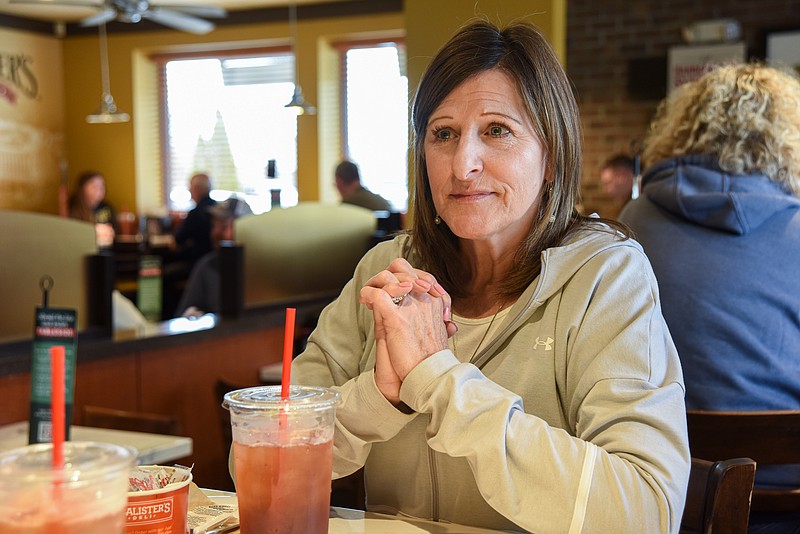"I went through the loss of my dad -- the way I know him -- a few years ago," Lorilie Parker said.
Despite being about an hour away from him, Parker is one of three caregivers for her father.
She, her brother and mother shared responsibility for keeping him well after he began showing signs of dementia.
Parker's father, John, suffered from strokes a little more than a decade ago. He recovered.
However, about three years ago, he ended up in a hospital, Parker said. He was confused and dehydrated. His family learned John was seeing three different doctors and each was prescribing the same medication.
Family members connected him with a new doctor, who found the correct diagnosis -- vascular dementia. Although it is not Alzheimer's disease, its effects are similar.
Vascular dementia occurs following strokes, according to www.alz.org. The strokes block major blood vessels in the brain.
"Thinking difficulties may begin as mild changes that gradually worsen as a result of multiple minor strokes, or another condition affects smaller blood vessels, leading to widespread damage," the site states. "Many experts believe vascular dementia remains under-diagnosed -- like Alzheimer's disease -- even though it's recognized as common."
Brain changes often coexist with changes associated with other types of dementia, including Alzheimer's disease. Studies have found vascular changes may interact in ways that increase the likelihood of dementia diagnosis.
Five to 10 percent of people with dementia have vascular dementia alone. It is more common as a part of mixed dementia.
One of the biggest hurdles for Parker's family was getting the entire family on the same page about the diagnosis, she said.
"Agreeing that dad does have dementia. No, he's not fine. No, he should not be driving," Parker said.
John often stays for periods with Parker and her family, she said. And she struggles not to treat him like a child.
"That is one of the biggest challenges," she said. "When I have him here at my house, which I do from time to time, (one of the challenges) is respecting him. It's easy to treat him like a child, and you don't want to do that -- even though they need a lot of help. Even though they want to do things they know they can't."
John also has diabetes, and uses an insulin/Epipen to regulate it. He'll turn his insulin up to "20," Parker said. She catches him and tells him "No, it is supposed to be 10. 'Twelve?' he'll ask. 'No, 10.'"
"He will have a grip on that pen like a 2-year-old," she said. "Distraction works really well -- telling him, 'We're done with that.' Then we can come back to it."
The disease takes an emotional toll on a patient's family.
Parker, a clinical documentation specialist at MU Health Care, said she would be cruising along at work, preparing for meetings, when out of the blue, she would cry.
She began attending Alzheimer's support group meetings.
The Alzheimer's Association's hotline (1-800-272-3900), its support groups and its information have helped dramatically, she said.
She soon convinced her mother to attend group meetings.
"She's learning to be patient," Parker said, "and how to continue to live her best life. And be supportive of him."
Jackie Kampeter is a caregiver for her mother, Fran Stenger, who is 88.
In about 2008, Stenger had a stroke, Kampeter said.
She did all right on her own for a while afterward, Kampeter said.
However, there were telltale signs that something was not right, she continued. Stenger would leave the stove on or forget how to get home.
The family began looking into nursing homes, Kampeter said.
Stenger did not want anything to do with a nursing home. She sat at Kampeter's kitchen table and started crying.
At that point, Kampeter didn't think her mother had to be in a nursing home -- she just needed a little extra attention.
So, the Kampeters offered to bring Stenger into their home.
She lived with the family for seven years, beginning in 2011.
Then, she had a fall in the middle of the night.
And it became apparent she needed around-the-clock care.
"I'm her secondary caregiver," Kampeter said. "I go in about five days a week."
She would spend entire days with Stenger until the pandemic struck.
"I could tell through COVID she declined," she said. "We couldn't go in. But I was able to go to the window. I would go every day. I took dry erase markers. We played Hangman. I learned how to write backwards very well."
Stenger loves Tic-Tac-Toe, Kampeter said.
"We tried to do things to keep her mind active. But I did notice a decline," she said.
Alzheimer's not only affects the patient, but it affects the family, she said.
"Luckily, we're not to the point where she doesn't know who we are," Kampeter said. "We walk in, and she lights up. She still knows. She still knows who we are."
Ever since her stroke, Kampeter said, Stenger doesn't retain new memories. She recognizes her great-grandchildren, but needs help pulling the names out of her memories.
Anyone whom she hasn't seen in a while, she struggles with.
"This is how Alzheimer's affects people. Mom used to be a very negative person. Now, she is the absolute sweetest," Kampeter said. "I tell my siblings, 'You guys are missing out on mom's best years.' She's a doll."
Alzheimer’s dementia afflicts 6.5 million Americans; the number could hit 8.5 million by 2030, according to the “2022 Alzheimer’s Disease Facts and Figures” report.
Related article:
Report says Alzheimer’s disease cases, deaths rising

